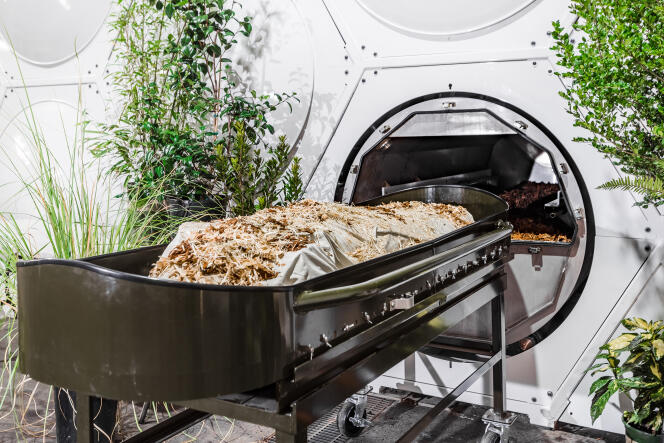“I have the impression of being between two generations, that of my parents and that of climate change. For me, it is essential to change our relationship with the living, including in the way we view death”, explains Pierre Berneur. This 36-year-old social innovation consultant first heard about humusation through a Belgian foundation, Métamorphose. Behind this term, a real social project: giving meaning to one’s time on Earth by reducing one’s ecological footprint. “I became a father in the spring of 2020, and it accelerated my thinking on these issues. Humusation, in the end, is the opposite of euthanasia: it is going from death to life. »
Pierre Berneur thus founded the Humo Sapiens association. The members are responsible for informing the general public of the terms of the protocol they defend, a synthesis of Belgian and French research. Concretely, the body of the deceased is wrapped in a biodegradable shroud, then covered with a layer of crushed material (dry matter), letting the micro-organisms do their work. “Humuseurs” (a sort of funeral home employee) intervene three to four months later to crush the solid materials, i.e. bones and teeth. Twelve months later, the compost was returned to the family.
In France, according to an OpinionWay survey “The French and terramation” for Humo Sapiens and the MAIF carried out in September 2022, 46% would be ready to use this practice. In the United States, in the six states concerned (including New York and California), the existing process is much more high-tech. The body is placed in a steel cylinder ventilated by oxygen, the temperature of which is monitored by sensors, which allows compost to be obtained in a record time of one month. The family can use it in their garden or entrust it to a specialized company which will disperse it in a park. Katrina Spade, the founder of Recompose, the pioneering American company in the field of humusation, says it clicked the day she realized that her corpse was going to poison the earth.
In fact, it must be recognized that neither burial nor cremation are ecological solutions. According to a study by funeral services in the City of Paris in 2017, the cremation of a deceased person emits an average of 233 kilos of CO2, the equivalent of a journey of 1,124 kilometers by car. Burial is much more polluting, with 830 kilos of CO2 cleared, i.e. 4,023 kilometers traveled by car. Not to mention the soil pollution caused by formalin, a powerful preservative injected for body conservation care. Enough to make some people want a more environmentally friendly death.
You have 35% of this article left to read. The rest is reserved for subscribers.
